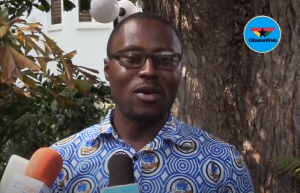 Dr Emmanuel Ayifah, the Deputy Country Director, SEND Ghana
Dr Emmanuel Ayifah, the Deputy Country Director, SEND Ghana
Dr Emmanuel Ayifah, the Deputy Country Director, SEND Ghana has stated that the 2019 budget statement failed to provide details on targets achieved on key child protection policies in 2018 and targets for 2019.
Dr Ayifah said the situation had made it difficult to track and hold government accountable for the use of public resources meant for child protection.
Speaking at a press briefing in Accra on 2019 post budget analysis, Dr Ayifah commended government on some specific initiatives which sought to aid in the implementation of the child and family welfare policy as well as the justice for children policy.
He said the establishment of community development would build the capacity of 1,000 social workforce in child and family welfare for child protection programme.
Dr Ayifah commended government for introducing the National Action Plan on ending the menace of Human Trafficking which is being implemented with the construction of four shelters for rehabilitating rescued victims of trafficking children.
He said governments in the past years had failed to meet the Comprehensive Africa Agriculture Development Programme obligations and invested less than 10 per cent of its annual expenditure in agriculture.
Dr Ayifah said their analysis showed that, 51.2 per cent of the Ministry’s projected expenditures in 2019 were set to be sourced from donors.
He urged government to increase funding to operationalise the existing institutional structure for coordinating social protection programmes at all levels and fast track the passage of the social protection law.
Touching on the agriculture sector, he said government initiatives for 2019 such as Rearing for Food and Jobs Programme; Planting for Export and Rural Development; and others, allocation for goods and services to the Ministry of Food and Agriculture had declined by 6.7 per cent.
He said the decline posed a potential challenge to the implementation of continuing and new initiatives, and risks government missing its target of having one million farmer beneficiaries.
Focusing on the tax, Dr Ayifrah said the introduction of the personal income tax band rate exceeding GHC10, 000.00 at a rate of 35 per cent in 2018 mid-year budget review was seen as a key revenue enhancing measure.
He said based on their estimation, the revenue targets for the last half year of 2018 were exceeded partly due to the introduction of personal income tax.
According to Dr Ayifrah, from the 2018 performance indicators, records show that personal tax revenue projection out-turn recorded a 0.6 per cent increase over the revised budget figure, adding that the tax band has the potential to reduce increasing income inequality in the country.
“Unfortunately, the 2019 budget proposal to review the income tax band to exceed GHC20,000.00 at a lower rate of 39 per cent would adversely affect revenue generation because the number of Ghanaians in high income bracket was low,” he added.
Mrs Ugonna Ukaigwe, the National Coordinator, Civil Society Organisation Platform on Sustainable Development Goals, said even though the 2019 budget statement shows government commitment to the goals, there was no policy direction in the budget on how government would enforce inclusivity in compliance with the principle of ‘no one behind’.
She urged government to specifically show in subsequent budgets the progress markers and benchmarks toward meeting the various targets of the goals.
“We urged government to develop, as part of its commitment to the goals, an ‘inclusive objective ‘that clearly itemise government’s vision for ‘leaving no one behind,” she added.